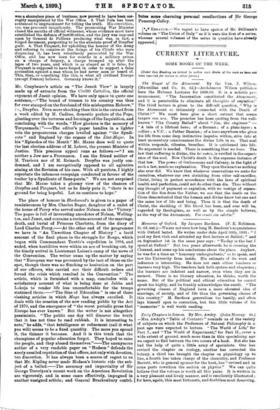CITRRENT LITERATURE.
SOME BOOKS OF THE WEEK.
[Under this Heading we intend to notice such Books of the week as have not been resured for renew in other forms.] The Gaspe/ of the Atonement. By the Yen. J. Wilson. (Macmillan and Co. 3s. fid.)—Archdeacon Wilson publishes here the Hulsean Lectures for 1898-99. It is a notable pro- nouncement. "The Incarnation constituted the Atonement, and it is permissible to eliminate all thoughts of expiation." The third lecture is given to the difficult question, "Why is the Atonement so intimately connected with the Death of Christ ?" We must here give a short extract that seems tan gere rem acu. The preacher has been quoting from the well- known" Pike County Ballad" about "Jim, the engineer" "A tale of a lifeboat hero ; of a fireman ; of a plate-layer ; a collier ; a V.C. ; a Father Damien ; of a hero anywhere who gives his life from some deep instinctive impulse within, stirs into at least momentary consciousness the divine Life in us. That soul within responds, vibrates, breathes. It is quickened into life. No argument is needed. There is something that we know. The law that suffering is divine, the 5E7 raileTv, is verified in the experi- ence of the soul. Now Christ's death is the supreme instance of that law. The power of Gethseuaane and Calvary, in the light of such a law, needs no explanation. They open the heart as nothing else ever did. We know that whatever reservations we make for ourselves, whatever our own shrinking from utter self-sacrifice, Christ, living in perfect accordance with the laws of spiritual health and perfection, could not do other than die. Thus without any thought of payment or expiation, with no vestige of separa- tion of the Son from the Father, we see that the death on the Cross demonstrated that the human and divine know but one and the same law of life and being. Thus it is that the death of Christ, the shedding of His blood, has been, and ever will be, regarded by theologians, as well as by the simple believer, as the way of the Atonement. Via crucis via saintis."






































 Previous page
Previous page